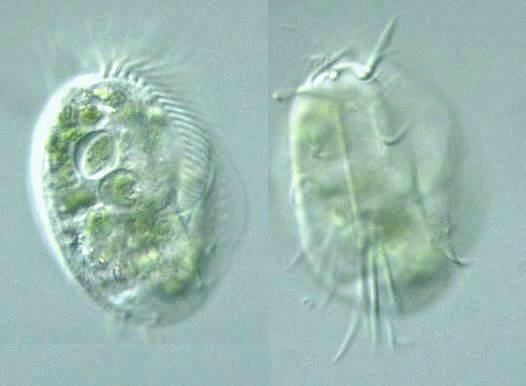

Spirotrichea:
Hypotrichia: Euplotida: Euplotidae
Euplotes sp.
Ehrenberg, 1830 (1831?)
 Genus: Body ovoid, inflexible; ventral surface flattened, dorsal surface convex; peristome broadly
triangular (Kudo, 1966).
Cell body is ovoid, dorsoventrally flattened; dorsal surface may be equipped with some ornamentation;
three groups of cirri (frontoventral, transverse & caudal); macronucleus C-shaped, "3"-shaped, or
horsehoe-shaped (Carey, 1992).
Genus: Body ovoid, inflexible; ventral surface flattened, dorsal surface convex; peristome broadly
triangular (Kudo, 1966).
Cell body is ovoid, dorsoventrally flattened; dorsal surface may be equipped with some ornamentation;
three groups of cirri (frontoventral, transverse & caudal); macronucleus C-shaped, "3"-shaped, or
horsehoe-shaped (Carey, 1992).
Species:
|
Euplotes sp.,
cell body 75 μm long, 59 μm wide,
peristome about 2/3 of the body length, 5 transverse cirri, ventrally ridged,
x 400, x 640, Uruguay, November 1999, photo by Y. Tsukii
 50 μm
50 μm
 100 μm
100 μm
 150 μm; x 400 :
150 μm; x 400 :
 31 μm
31 μm
 63 μm
63 μm
 94 μm; x 640
94 μm; x 640




Euplotes,
65 μm long,
45 μm wide,
peristome about 2/3 of the body length, 5 transverse cirri,
four dorsal ridges,
x 400, x 640, Uruguay, November 1999, photo by Y. Tsukii
 50 μm
50 μm
 100 μm
100 μm
 150 μm; x 400 :
150 μm; x 400 :
 31 μm
31 μm
 63 μm
63 μm
 94 μm; x 640
94 μm; x 640


Cyst formation






E. aspheronicus Agamaliev, 1966:
Cell body ellipsoid, not ornamented, 60 μm long;
peristome 1/2 of the body length;
9 frontoventral, 5 transverse, 4 caudal cirri;
macronucleus C-shaped (Carey, 1992).
E. zenkewitchi Burkovsky, 1970:
Cell body elongate rather than ovoid, not ornamented, 80 μm long;
peristome narrow, 1/2 of the body length;
9 frontoventral, 5 transverse, 3 or 4 caudal cirri;
macronucleus C-shaped (Carey, 1992).
E. cristatus Kahl, 1930-5:
Cell body small and ovoid, dorsally six prominent ridges, 60 μm long;
peristome narrow, 1/2 of the body length;
10 frontoventral, 5 transverse, 4 caudal cirri;
macronucleus C-shaped (Carey, 1992).
Please click on images for viewing enlarged.
Copyright
Protist Information Server
 Genus: Body ovoid, inflexible; ventral surface flattened, dorsal surface convex; peristome broadly
triangular (Kudo, 1966).
Cell body is ovoid, dorsoventrally flattened; dorsal surface may be equipped with some ornamentation;
three groups of cirri (frontoventral, transverse & caudal); macronucleus C-shaped, "3"-shaped, or
horsehoe-shaped (Carey, 1992).
Genus: Body ovoid, inflexible; ventral surface flattened, dorsal surface convex; peristome broadly
triangular (Kudo, 1966).
Cell body is ovoid, dorsoventrally flattened; dorsal surface may be equipped with some ornamentation;
three groups of cirri (frontoventral, transverse & caudal); macronucleus C-shaped, "3"-shaped, or
horsehoe-shaped (Carey, 1992).











